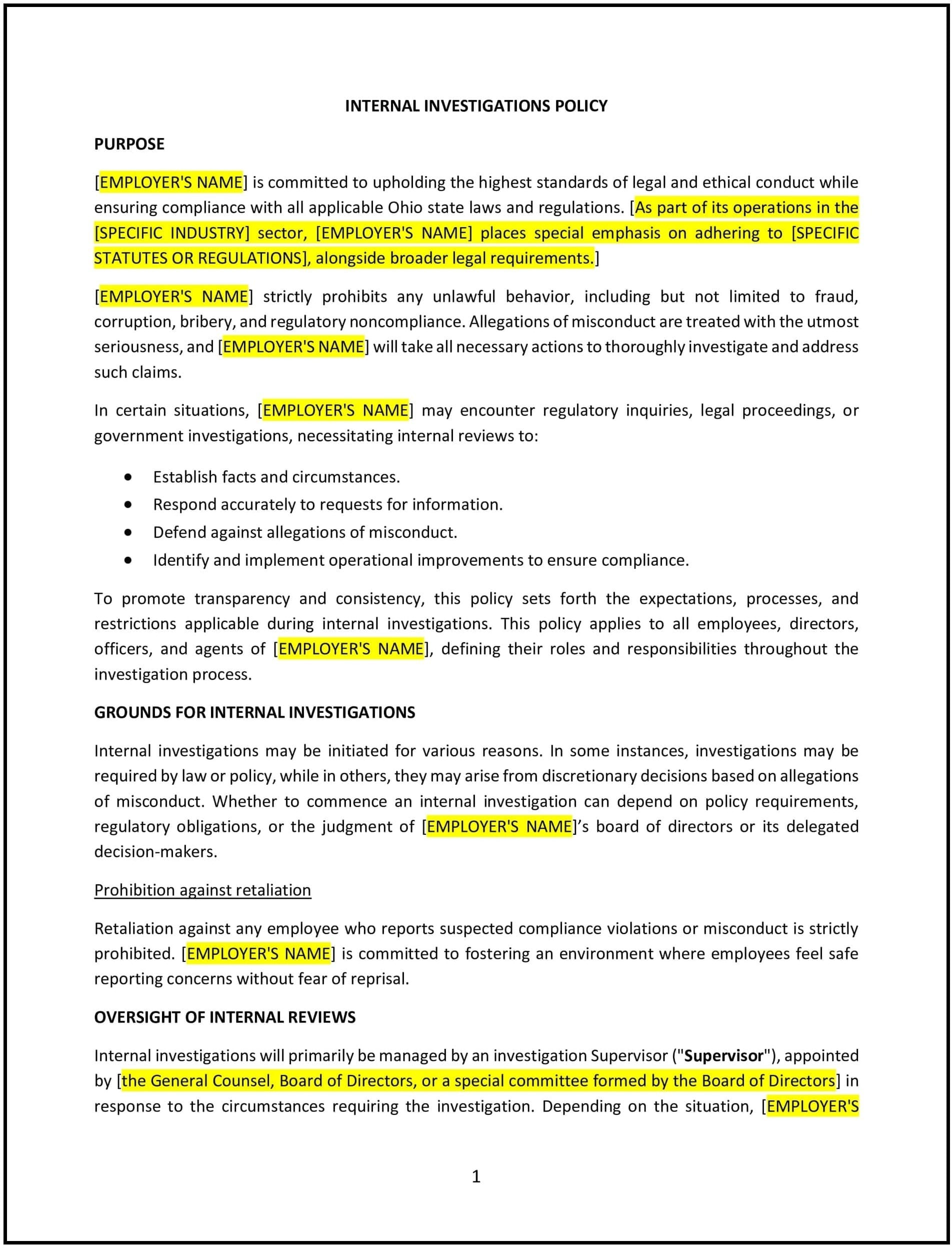Internal investigations policy (Ohio): Free template
Got contracts to review? While you're here for policies, let Cobrief make contract review effortless—start your free review now.

Customize this template for free
Internal investigations policy (Ohio)
An internal investigations policy provides Ohio businesses with guidelines for conducting investigations into workplace misconduct, including violations of company policies, ethical breaches, or illegal activities. This policy outlines the procedures for initiating, conducting, and concluding investigations, ensuring that all investigations are handled fairly, confidentially, and in accordance with applicable laws. It defines the roles and responsibilities of managers, human resources personnel, and external investigators, as well as the steps for reporting misconduct and addressing any findings.
By implementing this policy, Ohio businesses can maintain a fair and transparent process for addressing workplace issues, protect employee rights, and mitigate potential legal risks.
How to use this internal investigations policy (Ohio)
- Define types of misconduct: The policy should clearly outline what constitutes misconduct, including policy violations, harassment, discrimination, theft, fraud, or illegal activities. The policy should also specify that employees who suspect misconduct should report it promptly.
- Set procedures for initiating investigations: The policy should establish the process for initiating an investigation, including how complaints are received, who is responsible for initiating an investigation, and what information is needed to begin the process.
- Ensure confidentiality: The policy should emphasize the importance of maintaining confidentiality during the investigation process, including protecting the identities of those involved and ensuring that information is shared only with those who need to know.
- Outline roles and responsibilities: The policy should specify the roles of investigators, including human resources, managers, legal counsel, or external investigators, and outline their responsibilities in conducting fair, impartial investigations.
- Establish investigation procedures: The policy should define the steps to be followed during an investigation, including gathering evidence, interviewing witnesses, documenting findings, and making conclusions.
- Set expectations for cooperation: The policy should outline the expectations for employee cooperation during investigations, including participating in interviews and providing relevant information while respecting the confidentiality of the process.
- Define potential outcomes: The policy should specify the possible outcomes of an investigation, including disciplinary actions, corrective measures, or other steps to resolve the issue, as well as how these outcomes will be communicated to those involved.
- Address retaliation: The policy should make it clear that retaliation against employees who report misconduct or participate in investigations is strictly prohibited. Employees should be informed of their rights to report retaliation and the steps they can take if they experience it.
- Review and update regularly: The policy should be reviewed periodically to ensure that it remains aligned with Ohio state laws, business needs, and best practices related to internal investigations.
Benefits of using this internal investigations policy (Ohio)
This policy provides several key benefits for Ohio businesses:
- Promotes fairness: By establishing clear procedures for conducting investigations, the policy ensures that all employees are treated fairly and consistently when allegations of misconduct arise.
- Reduces legal risks: By following a transparent and consistent process for addressing misconduct, the business can reduce the risk of lawsuits, fines, and other legal consequences.
- Protects employee rights: The policy helps protect employees' rights by ensuring that investigations are conducted impartially and that any disciplinary actions are based on evidence and due process.
- Strengthens workplace culture: A well-structured internal investigations process promotes trust and transparency in the workplace, which can help reduce employee concerns about misconduct and improve morale.
- Mitigates business risks: Addressing misconduct promptly and effectively can help prevent more serious issues from arising, reducing the risk of harm to the business’s reputation or financial stability.
- Encourages accountability: By holding employees accountable for their actions, the policy helps create a work environment where ethical behavior is valued and misconduct is addressed appropriately.
- Demonstrates a commitment to ethics: The policy demonstrates the business’s commitment to maintaining a fair, ethical, and legally compliant workplace, which can improve the business's reputation with employees, customers, and other stakeholders.
Tips for using this internal investigations policy (Ohio)
- Communicate the policy clearly: Ensure that all employees are aware of the internal investigations policy by including it in the employee handbook, discussing it during onboarding, and providing training on how to report misconduct.
- Ensure thorough training: Provide regular training for managers, HR personnel, and any other employees involved in investigations to ensure they understand the procedures and legal considerations for conducting investigations.
- Maintain impartiality: Ensure that all investigations are conducted impartially, without bias or preconceived conclusions. The policy should emphasize the importance of neutrality and fairness throughout the process.
- Keep records of investigations: Maintain detailed records of all investigations, including the evidence gathered, interviews conducted, findings, and any actions taken. These records should be kept confidential and stored securely.
- Address issues promptly: The policy should specify that investigations should be conducted in a timely manner to resolve the issue quickly and effectively, while still ensuring that all facts are properly examined.
- Involve legal counsel if needed: In complex or high-risk cases, the policy should recommend involving legal counsel to ensure the investigation complies with all relevant laws and minimizes legal risks.
- Handle sensitive information with care: Ensure that sensitive information related to the investigation is handled with the utmost confidentiality and is shared only with those who need to know.
- Review and update regularly: Regularly review the policy to ensure it remains effective and aligned with changes in Ohio state laws, industry best practices, and business needs.